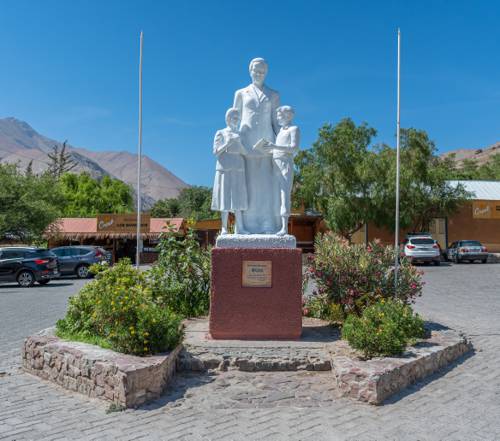
FAQ About Gabriela Mistral

Who was Gabriela Mistral?
Gabriela Mistral was a Chilean poet, educator, diplomat, and feminist. Born as Lucila Godoy Alcayaga, she is renowned for being the first Latin American author to win the Nobel Prize in Literature in 1945. Her works often reflect themes of love, sorrow, nature, and identity.

What are some of Gabriela Mistral's most famous works?
Some of Gabriela Mistral's most famous works include "Desolación" (1922), "Ternura" (1924), and "Lagar" (1954). These collections explore a variety of themes ranging from motherhood and love to loss and despair.

When did Gabriela Mistral win the Nobel Prize in Literature?
Gabriela Mistral was awarded the Nobel Prize in Literature in 1945, making her the first Latin American to receive this prestigious honor. The Nobel Committee recognized her "lyric poetry which, inspired by powerful emotions, has made her name a symbol of the idealistic aspirations of the entire Latin American world."

What themes are prevalent in Gabriela Mistral's poetry?
Gabriela Mistral's poetry often features themes such as love, motherhood, sorrow, nature, and the Latin American identity. Her work illustrates a deep empathy for the suffering of others, as well as a profound connection to the natural world.

What is the significance of Gabriela Mistral's pen name?
Gabriela Mistral took her pen name in honor of two of her favorite poets, Gabriele D'Annunzio and Frédéric Mistral. This choice reflects her admiration for these figures and suggests a synthesis of their influences in her own work.

Where was Gabriela Mistral born?
Gabriela Mistral was born in Vicuña, in the Elqui Valley of northern Chile on April 7, 1889. The region's landscapes and culture had a significant influence on her writing.

How did Gabriela Mistral contribute to education?
Gabriela Mistral was not only a poet but also a dedicated educator. She worked as a teacher and advocated for educational reforms in Chile and other Latin American countries. Her efforts helped improve and advance educational systems, particularly for children and women.

What was Gabriela Mistral's role as a diplomat?
Gabriela Mistral served as a diplomat for Chile in various countries, including Mexico, Italy, the United States, and Brazil. In her diplomatic roles, she focused on cultural promotion and international goodwill, enhancing Chile's presence on the global stage.

What impact did Gabriela Mistral have on Latin American literature?
Gabriela Mistral had a profound impact on Latin American literature by paving the way for female writers and voices in a predominantly male-dominated field. Her unique style and thematic focus influenced generations of writers and expanded the scope and recognition of Latin American literary works worldwide.

What personal struggles did Gabriela Mistral face?
Gabriela Mistral faced several personal struggles, including the early death of her beloved nephew, Juan Miguel Godoy, which deeply affected her and inspired some of her most poignant works. She also experienced themes of longing and solitude that permeate her poetry.

How does Gabriela Mistral's work reflect her feminist views?
Gabriela Mistral's work often champions the strength and dignity of women, reflecting her feminist views. Through her poetry, she addressed issues such as motherhood, female identity, and social injustices, advocating for the empowerment and education of women.

Did Gabriela Mistral write in languages other than Spanish?
Gabriela Mistral primarily wrote in Spanish, which was her native language, although her works have been translated into numerous languages, making her poetry accessible to a global audience.

What influenced Gabriela Mistral's writing style?
Gabriela Mistral's writing style was influenced by her rural upbringing, personal tragedies, and the natural landscapes of Chile. Her exposure to European literature and her work as an educator also shaped her poetic voice and thematic concerns.

How is Gabriela Mistral's legacy honored in Chile today?
Gabriela Mistral's legacy is honored in Chile through numerous institutions and landmarks bearing her name, including schools, libraries, and cultural centers. The Chilean government also celebrates her contributions to literature and education with various tributes and commemorative events.

What role did nature play in Gabriela Mistral's poetry?
Nature plays a central role in Gabriela Mistral's poetry, reflecting her deep connection to the Chilean landscapes where she grew up. Her work often depicts nature as a source of solace, beauty, and a metaphorical backdrop for the exploration of human emotions and experiences.

Why did Gabriela Mistral change her name from Lucila Godoy Alcayaga?
Gabriela Mistral adopted her pen name as a tribute to the poets Gabriele D'Annunzio and Frédéric Mistral, whose work she admired. It also symbolized her departure from her past and her emergence as a writer with a distinct literary identity.

How did Gabriela Mistral influence future poets?
Gabriela Mistral influenced future poets by demonstrating the power of personal and cultural expression. Her focus on universal themes such as love, motherhood, and social justice inspired many poets to explore similar subjects with honesty and introspection.

What awards did Gabriela Mistral receive during her lifetime?
Along with the Nobel Prize in Literature in 1945, Gabriela Mistral received several other awards, including the Chilean National Prize for Literature in 1951, recognizing her immense contributions to literature and culture.

What was Gabriela Mistral's educational philosophy?
Gabriela Mistral's educational philosophy centered on the belief that education should be accessible to all, particularly marginalized communities. She emphasized the importance of emotional intelligence, creativity, and nurturing well-rounded individuals capable of contributing positively to society.

What is one common misconception about Gabriela Mistral?
One common misconception about Gabriela Mistral is that her work was primarily focused on personal themes. While personal experiences influenced her poetry, she also addressed broader social and political issues, advocating for human rights and reform through her literature and diplomatic work.
